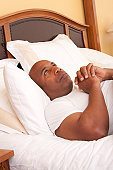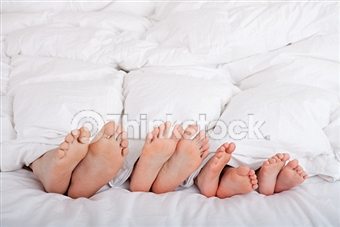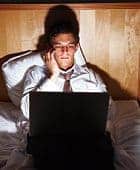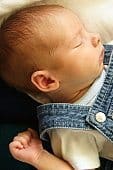Sleep loss leads to anxiety, poor food choices

In one study, fMRI scans on 18 healthy adults indicated that when deprived of sleep, the emotional centers of the brain trigger emotional dysfunction and risk. The more naturally anxious a person is, the more vulnerable he is to the effects of lack of sleep.
The second study used MRI scans on 23 healthy adults to show how sleep deprivation impairs regions of the brain where food choices are made. Lack of sleep significantly impairs the frontal lobe, which controls behavior and decision-making. The study of the scans may help shed light on the link between sleep loss and obesity.
The abstracts were presented in June at the annual meeting of the Associated Professional Sleep Societies in Boston.
Is sharing a bed good for your health?

longer than people who sleep alone.
According to a study from the University of Pittsburgh, shared sleep in healthy relationships promotes feelings of safety and security and may lower levels of the stress hormone cortisol.
Sleeping with a partner also may reduce cytokines, small protein molecules involved in inflammation, and boost the “love hormone” oxytocin, which lowers anxiety and is produced in the same part of the brain responsible for the sleep-wake cycle.
Two chemicals ‘paralyze’ muscles during REM sleep
Ever wonder why you don’t actually leap tall buildings in a single bound while you’re dreaming that you are?
Two University of Toronto neuroscientists have discovered two powerful chemicals in the brain that “paralyze” muscles when sleeping.
During rapid-eye movement sleep—the deep sleep during which most recalled dreams occur—your eyes continue to move, but the rest of your body’s muscles stop, potentially to prevent injury.
In a series of experiments, University of Toronto neuroscientists Patricia L. Brooks and John H. Peever found that the neurotransmitters gamma-aminobutyric acid and glycine caused REM sleep paralysis in rats by “switching off” the specialized cells in the brain that allow muscles to be active.
When the motor cells were cut off from all sources of the chemicals, the paralysis didn’t occur, allowing the rats to exhibit high levels of muscle activity when their muscles should have been inactive. The data suggest the two neurotransmitters must both be present to maintain motor control during sleep.
This finding may help scientists better understand and treat sleep disorders, including narcolepsy, teeth grinding and REM sleep behavior disorder. It could be especially helpful for those with REM sleep behavior disorder, which causes people to act out their dreams and can lead to serious injuries to the sleepers and others around them. It’s often an early indicator of neurodegenerative diseases, such as Parkinson’s.
The study was reported in the July 18 issue of The Journal of Neuroscience.
Artificial light at night compromises sleep

The damage is related to the disruption of the body’s daily rhythms and the loss of melatonin—a sleep-inducing, cancer-fighting hormone the body produces for 12 to 14 hours a night when a person is in darkness—that occurs when the eyes are exposed to light during the evening and night. The average American is in darkness for only six to eight hours a night. Interruptions to the natural circadian rhythms are believed to prevent sound sleep and increase the risk for heart disease, diabetes and breast and prostate cancer.
“The natural 24-hour cycle of light and dark helps maintain alignment of circadian biological rhythms along with basic processes that help our bodies to function normally,” said AMA board member Dr. Alexander Ding. “Excessive exposure to nighttime lighting disrupts these essential processes and can create potentially harmful health effects and hazardous situations.
“This type of disruption especially impacts those employed by industries requiring a 24-hour workforce as well those faced with unsafe driving conditions caused by artificial lights on cars and roadway illumination. By supporting new technologies that will reduce glare and minimize circadian disruption, the AMA is taking steps to improve both public health and public safety.”
Share a room, not a bed, with baby

To help parents make the safest decisions, First Candle, a national nonprofit health organization dedicated to infant health and survival, suggests parents put babies to sleep near the adult bed, but in their own separate space. In other words, “room share” rather than “bed share” with their baby.
First Candle offers these tips to create a safe sleep zone for an infant:
- Place babies on their backs at nap time and bedtime.
- Use a crib that meets current safety standards, with a firm mattress that fits snuggly in the crib.
- The mattress should be covered with only a tight-fitting crib sheet.
- Remove all soft, loose or fluffy bedding and other items from the baby’s sleep area. This includes pillows, comforters, blankets, bumpers and stuffed animals.
- Dress baby in a wearable blanket or sleeper to keep her warm and safe.




